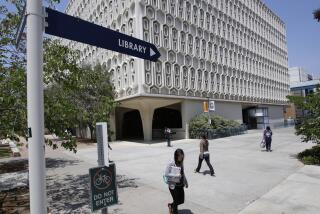Cost of College Up Over 40% in 10 Years, Study Finds
- Share via
WASHINGTON — The cost of higher education across the nation has risen more than 40% over the last 10 years, according to a study released Tuesday by the College Board.
The annual report, “Trends in College Pricing,” said declines in state funding, endowments and fund-raising had contributed to soaring tuition costs at four-year public and private universities.
“In a troubled economy, colleges are faced with ... holding down prices without sacrificing educational quality,” said Gaston Caperton, president of the College Board, a nonprofit group that owns the Scholastic Assessment Test, a standardized test that many colleges require for admission.
Average tuition fees at four-year, state-funded colleges jumped 47% over 10 years, the study found. During the same period, tuition for private universities rose 42%.
“Hyperinflation in college costs has been pummeling parents and students for more than a decade, and the problem has not been a lack of spending by states or the federal government,” said Rep. John A. Boehner (R-Ohio), who chairs the House Committee on Education and the Workforce. “Even when states were increasing their investment in higher education in recent years, college tuition was skyrocketing.”
On a yearly basis, the sharpest fee hikes occurred at four-year public colleges, where average tuition costs rose to $4,694, a 14.1% increase from 2002, College Board officials said. Tuition at four-year private colleges reached an average of $19,710 this year, up 6% from 2002. At two-year public institutions, tuition rose to an average of $1,905, up 13.8% from last year.
The trend has sparked an effort by lawmakers to end steep tuition increases.
Rep. Howard P. “Buck” McKeon (R-Santa Clarita) has introduced a bill that would hold institutions accountable for raising tuition by denying them access to certain federal aid programs.
The study, McKeon said, shows that “college tuition fees keep going up much faster than the rate of inflation. We just need to continue to pursue a course that will bring these charges in line. We’re losing the opportunity for too many of our young people to go to school.”
College board officials said more than $40 billion in state and federal grants, which students are not required to repay, were distributed this year. More than 60% of undergraduates at private institutions received some form of aid, the study said.
Colleges and universities across the country are looking for ways to slash spending, including outsourcing some campus services and lowering operational costs, said David L. Warren, president of the National Assn. of Independent Colleges and Universities.
“There is no one-size-fits-all approach to affordability,” Warren said.
Private colleges have taken “innovative cost-cutting and affordability initiatives to keep the impact of tuition increases ... as low as possible, without cutting into the academic quality,” Warren said.
The average cost of attending a four-year private college, including tuition, room and board, is $26,854, an increase of more than 5% from last year, the study found.
*
Times staff writers Nick Anderson in Washington and Rebecca Trounson in Los Angeles contributed to this report.
More to Read
Sign up for Essential California
The most important California stories and recommendations in your inbox every morning.
You may occasionally receive promotional content from the Los Angeles Times.













